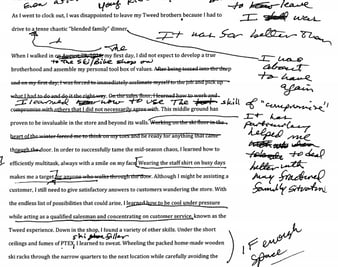Neal Schwartz
- 10 May, 2021
- 0 Comments
- 3 Mins Read
WHY YOUR COLLEGE ESSAY MAY BE MORE IMPORTANT THAN YOUR TEST SCORES

As we all know, the college application can be a long and complicated endeavor. We can think of the college application as a portfolio of student performance across a wide variety of metrics that allows admissions officers to judge the quality and potential of the students they’ll accept. The most important elements have long been known to be GPA, test scores, recommendations and last but not least, the college essay.
However, we’ve been seeing a noteworthy shift away from the quantitative towards more abstract ways of evaluating a student. After the test-optional phase of many colleges, a lot of the emphasis has been taken away from the SATs and ACTs this year. This is in part due to the pandemic, because these tests became less available with the sanitary conditions. Even with the end of the pandemic in sight and the “return to normal” somewhat imminent, some colleges are recognizing how test scores pigeon-holed for a certain demographic. That leads to certain colleges adapting a permanent test-optional policy. This was a sigh of relief for a lot of students who were poor test takers or didn’t have access to tutoring. In any case, standardized college entrance testing has been criticized for a while as being biased to the advantage of high income families. So maybe, COVID-19 was the straw that broke the camel’s back.
With tests now optional for an increasing number of schools, this means that more “soft factors” will play a larger role in the evaluation of applications. What are these “soft factors”? Well, they are metrics that require subjective analysis, such as writing. Because there is no “right” or “wrong” or “high” or “low” scores pre-defined for college essays, this means that essays will trump test scores by their weight in the overall admissions decision.

However, now that the essay is coming to the forefront, there has been some recent criticism that class and privilege still biases this seemingly more qualitative metric. According to a recent article in the New York Times, essay theme often has a correlation with family income. Lower income families tend to focus on themes of economic hardship or abuse, whereas higher income families can afford to branch out to more abstract subjects as sports, creativity and philosophical inquiries.
The differences may be visible in a less blatant way, but they are still there. But the important thing to keep in mind is that inequalities exist in every domain, and colleges remain, among other things, businesses. This means that family income will definitely be an important factor, like it or not.
But the importance of income will depend according to the kind of school you’re applying to. We mentioned in a recent blog post that “buyer” schools are more likely to award scholarships independent of need, whereas “seller” schools are generally more accessible to students that can afford to pay the full price.
The big takeaway here is not that college will always favor higher income students, but that the application metrics are evolving to become more and more fair. Instead of the black and white of test scores and GPA, colleges are taking the time to evaluate the gray areas like essays, extracurriculars and recommendations to even out the playing field.
So this means that students should really put a lot of their focus into these “soft factors”, and keep the word, “holistic,” in mind when preparing applications.
For some help get a quick start on the application, give us a call to sign up for our summer student application course and get a free consultation!
Best Regards,

Neal Schwartz, Owner
College Planning of Westchester
nschwartz@collegeplanningofwestchester.com
914-273-2353 (office)
914-500-5899 (mobile/text)
NOW IN OUR 19TH YEAR

NOW REGISTERING FOR OUR:
COLLEGE COUNSELING PROGRAM AND SAT/ACT TEST PREP PROGRAMS
NOW IS THE BEST TIME FOR TEST PREP AND COLLEGE APPLICATIONS
Register Today








